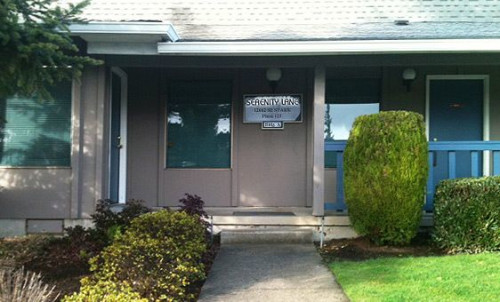

Serenity Lane East Portland
Treatment Focus
This center treats substance use disorders and co-occurring mental health conditions. Your treatment plan addresses each condition at once with personalized, compassionate care for comprehensive healing.
Primary Level of Care
Outpatient treatment offers flexible therapeutic and medical care without the need to stay overnight in a hospital or inpatient facility. Some centers offer intensive outpatient program (IOP), which falls between inpatient care and traditional outpatient service.
This provider hasn't verified their profile's information. Are you the owner of this center? Claim your listing to better manage your presence on Recovery.com.
Treatment Focus
This center treats substance use disorders and co-occurring mental health conditions. Your treatment plan addresses each condition at once with personalized, compassionate care for comprehensive healing.
Primary Level of Care
Outpatient treatment offers flexible therapeutic and medical care without the need to stay overnight in a hospital or inpatient facility. Some centers offer intensive outpatient program (IOP), which falls between inpatient care and traditional outpatient service.
Provider's Policy
We accept most insurance plans. Our Program Manager will discuss costs of treatment and insurance coverage with you. At Serenity Lane we offer programs at a reduced rate, depending on your financial situation. Payment plans are available.
Serenity Lane East Portland
Serenity Lane East Portland
About Serenity Lane East Portland
Serenity Lane was co-founded by Tom Kerns, who was inspired after he lost his dad at a young age to alcoholism to make addiction treatment services accessible to all. The center admits patients 7 days a week with the possibility of same day admission. Serenity Lane East Portland provides a variety of outpatient treatment options for clients seeking recovery from substance use disorders, individuals with a dual diagnosis of a substance use disorder with another mental health concern, and those with only a mental health concern. The center has many virtual options including virtual mental health therapy and offers both daytime and evening programming. They offer confidential initial screening, assessments with care planning, and 12-step participation. Individuals can receive consultation and referrals to community agencies as needed.
Serenity Lane East Portland offers two levels of outpatient programming for alcohol and drug addiction treatment. Their level II intensive outpatient program (IOP) is a 10 week program that includes group therapy, individual counseling, and education about addiction. Treatment groups meet 3 times a week for 3 hours per session. The family support group meets weekly for 3 hours which includes a 90 minute family-only processing session followed by a 90 minute patient and family session. The center’s level I outpatient program meets once a week for 1.5 hour sessions to learn how to identify and manage stressful life events and learn ways to cope with the ups and downs of early recovery.
Alumni Services
Serenity Lane offers fun events, alumni recovery support meetings, service opportunities, and helpful tips for growing in recovery through their alumni services with some virtual options. In addition, individuals will have access to recovery support for one full year after completion of outpatient treatment.
Family Program
Serenity Lane offers a family program at no additional cost, which incorporates education, therapy, and support to rebuild family relationships and communication. They also offer support groups for families. Spouses and significant others can attend their family programming sessions on Mondays 6-9PM and family sessions can be scheduled with the patient’s primary counselor as needed.
Driving Under the Influence of Intoxicants (DUII) Programming
The DUII education and diversion programs at Serenity Lane are certified by the state of Oregon and fulfill all court and DMV requirements. Serenity Lane offers DMV certified diversion, treatment groups, and education groups. For individuals who are mandated to treatment, they offer a “Blue Flag” program where patients' progress and attendance can be monitored and reported.
Employer/EAP Services
This center offers special training for business and industry through their employer services program. Training options include recognizing signs of substance abuse, coordinating FMLA, reintegrating employees into the workplace, and more.
Highlights from the Center
Highlights
These highlights are provided by and paid for by the center.
CARF Accredited
Center Overview
Treatment Focus
This center treats substance use disorders and co-occurring mental health conditions. Your treatment plan addresses each condition at once with personalized, compassionate care for comprehensive healing.
CARF Accredited
CARF stands for the Commission on Accreditation of Rehabilitation Facilities. It's an independent, non-profit organization that provides accreditation services for a variety of healthcare services. To be accredited means that the program meets their standards for quality, effectiveness, and person-centered care.

Insurance Accepted
Cash Pay Rates
Estimated Cash Pay Rate
Center pricing can vary based on program and length of stay. Contact the center for more information. Recovery.com strives for price transparency so you can make an informed decision.
Levels of Care






Your Care Options
Specializations
Who We Treat
Approaches
Personalized Treatment
The specific needs, histories, and conditions of individual patients receive personalized, highly relevant care throughout their recovery journey.
Twelve Step
Incorporating spirituality, community, and responsibility, 12-Step philosophies prioritize the guidance of a Higher Power and a continuation of 12-Step practices.
Evidence-Based
A combination of scientifically rooted therapies and treatments make up evidence-based care, defined by their measured and proven results.
Family Involvement
Providers involve family in the treatment of their loved one through family therapy, visits, or both–because addiction is a family disease.
Individual Treatment
Individual care meets the needs of each patient, using personalized treatment to provide them the most relevant care and greatest chance of success.
Therapies
1-on-1 Counseling
Patient and therapist meet 1-on-1 to work through difficult emotions and behavioral challenges in a personal, private setting.
Family Therapy
Family therapy addresses group dynamics within a family system, with a focus on improving communication and interrupting unhealthy relationship patterns.
Twelve Step Facilitation
12-Step groups offer a framework for addiction recovery. Members commit to a higher power, recognize their issues, and support each other in the healing process.
Psychoeducation
This method combines treatment with education, teaching patients about different paths toward recovery. This empowers them to make more effective decisions.
Online Therapy
Patients can connect with a therapist via videochat, messaging, email, or phone. Remote therapy makes treatment more accessible.
Eye Movement Therapy (EMDR)
Lateral, guided eye movements help reduce the emotional reactions of retelling and reprocessing trauma, allowing intense feelings to dissipate.
Relapse Prevention Counseling
Relapse prevention counselors teach patients to recognize the signs of relapse and reduce their risk.
Conditions We Treat
Post Traumatic Stress Disorder
PTSD is a long-term mental health issue caused by a disturbing event or events. Symptoms include anxiety, dissociation, flashbacks, and intrusive thoughts.
Anxiety
Anxiety is a common mental health condition that can include excessive worry, panic attacks, physical tension, and increased blood pressure.
Depression
Symptoms of depression may include fatigue, a sense of numbness, and loss of interest in activities. This condition can range from mild to severe.
Codependency
Codependency is a pattern of emotional dependence and controlling behavior. It's most common among people with addicted loved ones.
Trauma
Some traumatic events are so disturbing that they cause long-term mental health problems. Those ongoing issues can also be referred to as "trauma."
Substances We Treat
Cocaine
Cocaine is a stimulant with euphoric effects. Agitation, muscle ticks, psychosis, and heart issues are common symptoms of cocaine abuse.
Prescription Drugs
It's possible to abuse any drug, even prescribed ones. If you crave a medication, or regularly take it more than directed, you may have an addiction.
Benzodiazepines
Benzodiazepines are prescribed to treat anxiety and sleep issues. They are highly habit forming, and their abuse can cause mood changes and poor judgement.
Co-Occurring Disorders
A person with multiple mental health diagnoses, such as addiction and depression, has co-occurring disorders also called dual diagnosis.
Drug Addiction
Drug addiction is the excessive and repetitive use of substances, despite harmful consequences to a person's life, health, and relationships.
Chronic Relapse
Consistent relapse occurs repeatedly, after partial recovery from addiction. This condition requires long-term treatment.
Heroin
Heroin is a highly addictive and illegal opioid. It can cause insomnia, collapsed veins, heart issues, and additional mental health issues.
Methamphetamine
Methamphetamine, or meth, increases energy, agitation, and paranoia. Long-term use can result in severe physical and mental health issues.
Languages
Aftercare
Intensive Outpatient Program
In an IOP, patients live at home or a sober living, but attend treatment typically 9-15 hours a week. Most programs include talk therapy, support groups, and other methods.
Care Designed for Your Needs
Special Considerations
Activities
Smoking and Vaping Policy






